Webster (281) 316-3338
Alvin (281) 331-3525
Webster (281) 316-3338
Alvin (281) 331-3525

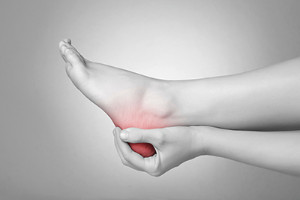 Plantar fasciitis, one of the most common causes of heel pain, is a condition that many people suffer from. Among those who do are runners and athletes, those who are overweight, and people who have to stand for extended periods of time. While not life-threatening, it can cause substantial pain and discomfort to those who experience it. Thankfully, there are some things that you can do to help alleviate the pain. First, rest your feet and avoid overexerting them in any strenuous activities that may have led to the heel pain. Second, ice your feet and use anti-inflammatory medications prescribed or recommended by a podiatrist. Some podiatrists may suggest some form of relatively light physical therapy to strengthen the feet, however this is not always recommended. Maintaining a healthy weight can also reduce the stress on the feet that could have led to heel pain. Finally, be sure to wear comfortable shoes that have good cushioning and support.
Plantar fasciitis, one of the most common causes of heel pain, is a condition that many people suffer from. Among those who do are runners and athletes, those who are overweight, and people who have to stand for extended periods of time. While not life-threatening, it can cause substantial pain and discomfort to those who experience it. Thankfully, there are some things that you can do to help alleviate the pain. First, rest your feet and avoid overexerting them in any strenuous activities that may have led to the heel pain. Second, ice your feet and use anti-inflammatory medications prescribed or recommended by a podiatrist. Some podiatrists may suggest some form of relatively light physical therapy to strengthen the feet, however this is not always recommended. Maintaining a healthy weight can also reduce the stress on the feet that could have led to heel pain. Finally, be sure to wear comfortable shoes that have good cushioning and support.
Many people suffer from bouts of heel pain. For more information, contact Dr. Douglas Webb of Texas. Our doctor can provide the care you need to keep you pain-free and on your feet.
Causes of Heel Pain
Heel pain is often associated with plantar fasciitis. The plantar fascia is a band of tissues that extends along the bottom of the foot. A rip or tear in this ligament can cause inflammation of the tissue.
Achilles tendonitis is another cause of heel pain. Inflammation of the Achilles tendon will cause pain from fractures and muscle tearing. Lack of flexibility is also another symptom.
Heel spurs are another cause of pain. When the tissues of the plantar fascia undergo a great deal of stress, it can lead to ligament separation from the heel bone, causing heel spurs.
Why Might Heel Pain Occur?
Treatments
Heel pain should be treated as soon as possible for immediate results. Keeping your feet in a stress-free environment will help. If you suffer from Achilles tendonitis or plantar fasciitis, applying ice will reduce the swelling. Stretching before an exercise like running will help the muscles. Using all these tips will help make heel pain a condition of the past.
If you have any questions please contact one of our offices located in Alvin and Webster, TX . We offer the newest diagnostic and treatment technologies for all your foot and ankle needs.
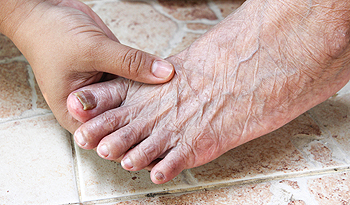 Taking good care of your feet becomes more important as you get older. Age tends to exacerbate foot issues, with many people over the age of 65 reportedly suffering from foot pain. Another common issue among the elderly is diabetes. Diabetes causes neuropathy, or nerve loss, in the lower body, especially in the feet. Diabetics suffer from poor blood circulation in the legs and feet as well. This means that if a diabetic sustains a wound, they may not realize it due to loss of sensation, and the wound may not heal properly. In severe cases, amputation may be necessary if the infection significantly worsens. Because of this, elderly diabetics need to take extra care of their feet, though most elderly people will also benefit from practicing good foot health. Good foot health strategies include daily foot inspections for any abnormalities, washing and drying the feet, keeping one's diabetes in check, and wearing quality socks and footwear that will protect the feet and provide ample foot support. Finally, performing a check-up with a podiatrist yearly is also recommended.
Taking good care of your feet becomes more important as you get older. Age tends to exacerbate foot issues, with many people over the age of 65 reportedly suffering from foot pain. Another common issue among the elderly is diabetes. Diabetes causes neuropathy, or nerve loss, in the lower body, especially in the feet. Diabetics suffer from poor blood circulation in the legs and feet as well. This means that if a diabetic sustains a wound, they may not realize it due to loss of sensation, and the wound may not heal properly. In severe cases, amputation may be necessary if the infection significantly worsens. Because of this, elderly diabetics need to take extra care of their feet, though most elderly people will also benefit from practicing good foot health. Good foot health strategies include daily foot inspections for any abnormalities, washing and drying the feet, keeping one's diabetes in check, and wearing quality socks and footwear that will protect the feet and provide ample foot support. Finally, performing a check-up with a podiatrist yearly is also recommended.
Proper foot care is something many older adults forget to consider. If you have any concerns about your feet and ankles, contact Dr. Douglas Webb from Texas. Our doctor can provide the care you need to keep you pain-free and on your feet.
The Elderly and Their Feet
As we age we start to notice many changes in our body, but the elder population may not notice them right away. Medical conditions may prevent the elderly to take notice of their foot health right away. Poor vision is a lead contributor to not taking action for the elderly.
Common Conditions
Susceptible Infections
Diabetes and poor circulation can cause general loss of sensitivity over the years, turning a simple cut into a serious issue.
If you have any questions please feel free to contact one of our offices located in Alvin and Webster, TX . We offer the newest diagnostic and treatment technologies for all your foot and ankle needs.
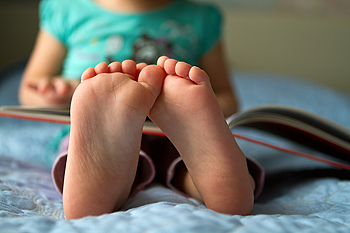 Diabetes presents a number of problems for those who have it. This is especially true for children, who are more likely to sustain a foot injury from playing. Due to decreased sensitivity, a child may not realize they have a wound and not tell their parent. Coupled with poor blood circulation, the wound may not heal and may become infected; this could be very dangerous and, in extreme cases, potentially result in amputation. Both parents and children should know what to look for and how to care for diabetic feet. This includes doing daily foot inspections for wounds or any abnormal signs. Diabetic children should wash their feet with warm water and make sure to dry them properly. Make sure to avoid extremely hot and cold environments, and check the water temperature first before washing. Children should also avoid walking barefoot. Be sure to inspect shoes for any objects inside and to ensure the interior is smooth. Finally, seeing a podiatrist for an examination several times a year is highly recommended.
Diabetes presents a number of problems for those who have it. This is especially true for children, who are more likely to sustain a foot injury from playing. Due to decreased sensitivity, a child may not realize they have a wound and not tell their parent. Coupled with poor blood circulation, the wound may not heal and may become infected; this could be very dangerous and, in extreme cases, potentially result in amputation. Both parents and children should know what to look for and how to care for diabetic feet. This includes doing daily foot inspections for wounds or any abnormal signs. Diabetic children should wash their feet with warm water and make sure to dry them properly. Make sure to avoid extremely hot and cold environments, and check the water temperature first before washing. Children should also avoid walking barefoot. Be sure to inspect shoes for any objects inside and to ensure the interior is smooth. Finally, seeing a podiatrist for an examination several times a year is highly recommended.
Making sure that your children maintain good foot health is very important as they grow. If you have any questions, contact Dr. Douglas Webb of Texas. Our doctor can provide the care you need to keep you pain-free and on your feet.
Keeping Children's Feet Healthy
Having healthy feet during childhood can help prevent medical problems later in life, namely in the back and legs. As children grow, their feet require different types of care. Here are some things to consider...
Although babies do not walk yet, it is still very important to take care of their feet.
Avoid putting tight shoes or socks on his or her feet.
Allow the baby to stretch and kick his or her feet to feel comfortable.
As a toddler, kids are now on the move and begin to develop differently. At this age, toddlers are getting a feel for walking, so don’t be alarmed if your toddler is unsteady or ‘walks funny’.
As your child gets older, it is important to teach them how to take care of their feet.
Show them proper hygiene to prevent infections such as fungus.
Be watchful for any pain or injury.
Have all injuries checked by a doctor as soon as possible.
Comfortable, protective shoes should always be worn, especially at play.
If you have any questions please feel free to contact one of our offices located in Alvin and Webster, TX . We offer the newest diagnostic and treatment technologies for all your foot and ankle needs.
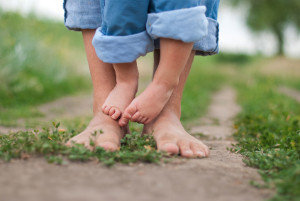 Having your child play on the playground barefooted may be a good idea, according to some podiatrists and parenting experts. Its proposed benefits include proper foot function, foot development, better balance, and proprioception, which is how the body senses movement. Parents are recommended to try it themselves. Proponents point to studies that show how it strengthens the feet and legs, determining that people are less likely to suffer from conditions like bunions or corns. Going barefoot is still a debated topic and has its own pros and cons. If you or your child going barefoot interests you, be sure to check with a podiatrist to see if it's right for both of you.
Having your child play on the playground barefooted may be a good idea, according to some podiatrists and parenting experts. Its proposed benefits include proper foot function, foot development, better balance, and proprioception, which is how the body senses movement. Parents are recommended to try it themselves. Proponents point to studies that show how it strengthens the feet and legs, determining that people are less likely to suffer from conditions like bunions or corns. Going barefoot is still a debated topic and has its own pros and cons. If you or your child going barefoot interests you, be sure to check with a podiatrist to see if it's right for both of you.
Barefoot running has its own share of benefits and disadvantages. If you have any concerns about your feet or ankles, contact Dr. Douglas Webb from Texas. Our doctor will treat your foot and ankle needs.
Barefoot Running
The Impact of Barefoot Running
The Advantages of Barefoot Running
The Drawbacks of Barefoot Running
So, what can runners do to make barefoot running safe? It’s best to make a slow transition from running shoes to barefoot running. Once the feet begin to adjust, try walking, then jogging and gradually increasing the distance. Minimalist running shoes may also be an option.
If you have any questions please feel free to contact one of one of our offices located in Alvin and Webster, TX . We offer the newest diagnostic and treatment technologies for all your foot and ankle needs.
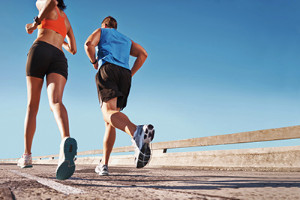 Some of the most common complaints people have with their feet are pain, ingrown toenails, cracked heels, and fungus. When it comes to foot pain, many people are unaware that flat shoes can be just as bad as high heels. Flats do not offer any support for the foot, which can cause those who wear them to experience a lot of pain. Ingrown toenails are often the result of cutting your nails incorrectly; instead of cutting your nails in a rounded shape, you should cut them straight across. If you are trying to cure your cracked heels, you should know that they are caused by a lack of moisture in the feet. A helpful tip is to always moisturize and treat your feet the same way you would want to treat the skin on your face. If you want to get rid of toenail fungus, you should always treat it in its early stages, instead of letting it progress into something much worse. If you have any questions about any of these common foot issues, you should speak to a podiatrist right away.
Some of the most common complaints people have with their feet are pain, ingrown toenails, cracked heels, and fungus. When it comes to foot pain, many people are unaware that flat shoes can be just as bad as high heels. Flats do not offer any support for the foot, which can cause those who wear them to experience a lot of pain. Ingrown toenails are often the result of cutting your nails incorrectly; instead of cutting your nails in a rounded shape, you should cut them straight across. If you are trying to cure your cracked heels, you should know that they are caused by a lack of moisture in the feet. A helpful tip is to always moisturize and treat your feet the same way you would want to treat the skin on your face. If you want to get rid of toenail fungus, you should always treat it in its early stages, instead of letting it progress into something much worse. If you have any questions about any of these common foot issues, you should speak to a podiatrist right away.
Everyday foot care is very important to prevent infection and other foot ailments. If you need your feet checked, contact Dr. Douglas Webb from Texas. Our doctor can provide the care you need to keep you pain-free and on your feet.
Everyday Foot Care
Often, people take care of their bodies, face and hair more so than they do for their feet. But the feet are a very important aspect of our bodies, and one that we should pay more attention to. Without our feet, we would not be able to perform most daily tasks.
It is best to check your feet regularly to make sure there are no new bruises or cuts that you may not have noticed before. For dry feet, moisturizer can easily be a remedy and can be applied as often as necessary to the affected areas. Wearing shoes that fit well can also help you maintain good foot health, as well as making it easier to walk and do daily activities without the stress or pain of ill-fitting shoes, high heels, or even flip flops. Wearing clean socks with closed shoes is important to ensure that sweat and bacteria do not accumulate within the shoe. Clean socks help to prevent Athlete’s foot, fungi problems, bad odors, and can absorb sweat.
If you have any questions please feel free to contact one of our offices located in Alvin and Webster, TX . We offer the newest diagnostic and treatment technologies for all your foot and ankle needs.
Our feet are important in our everyday lives. The problem is that we tend to neglect them. When this becomes a habit, it can cause significant trouble. Ignoring foot problems can mean pain, limited mobility, and expensive doctor's visits. On the other hand, if feet are cared for and looked after regularly, they will perform without pain or complication.
Routine hygiene is the most basic way to care for the feet. Wash and dry them thoroughly daily. Remember to get between the toes and keep the toenails trimmed and short. If the feet feel dry or there are signs of dryness or cracking, use a moisturizer designed for the feet.
When using moisturizer on the feet, try to avoid applying between the toes. If cream or lotion sits too long, they can cause fungal and bacterial growth. When moisturizer is used between the toes, it can also cause the skin to soften too much.
Shoes are also an important aspect of foot care. When one is picking out shoes, make sure they are the correct size. Shoes need to be snug, but not too tight. On the other hand, if shoes are too loose they can cause foot problems as well. It is highly recommended that shopping for new shoes be done later in the day. The reason for this is that the feet will have settled and swelled to their full size by then. To keep your feet at their most healthy, avoid wearing high heels or flip flops too often. Instead, choose shoes that are good for your feet. Good shoes pad the soles of your feet and support the arches and ankles.
Socks should also be worn daily with closed-toe shoes. They may feel hot during the summer months, but they absorb sweat and moisture off the feet. Without socks, the build-up of sweat in a closed-toe shoe can cause fungal problems and athlete's foot.
The best thing to remember in every day foot care is that shoes do make a difference. If you spend a lot of time on your feet, make sure that your shoes show no signs of wear. Shoes should offer ample support for the arches and the overall foot. Additionally, try to make foot cleaning and maintenance a daily habit. If you keep these things in mind, your feet will stay healthy and safe.
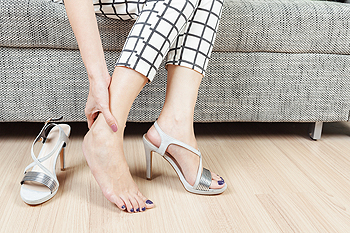 Almost every woman is guilty of owning a pair of high heels. While there are a few pros that come along with wearing heels, the amount of cons outweighs them. One of the common issues with high heels is the pain they cause to those who wear them. The worst pain tends to occur at the ball of the foot, since this is the part that is experiencing the most pressure. Additionally, it is hard for women to find their balance while wearing heels. This can lead to some dangerous injuries while wearing them. Another problem that stems from heels is the fact that they force your toes into an unnatural position. This shifting movement has the potential to cause pain in your toes and calluses.
Almost every woman is guilty of owning a pair of high heels. While there are a few pros that come along with wearing heels, the amount of cons outweighs them. One of the common issues with high heels is the pain they cause to those who wear them. The worst pain tends to occur at the ball of the foot, since this is the part that is experiencing the most pressure. Additionally, it is hard for women to find their balance while wearing heels. This can lead to some dangerous injuries while wearing them. Another problem that stems from heels is the fact that they force your toes into an unnatural position. This shifting movement has the potential to cause pain in your toes and calluses.
High heels have a history of causing foot and ankle problems. If you have any concerns about your feet or ankles, contact Dr. Douglas Webb from Texas. Our doctor can provide the care you need to keep you pain-free and on your feet.
Effects of High Heels on the Feet
High heels are popular shoes among women because of their many styles and societal appeal. Despite this, high heels can still cause many health problems if worn too frequently.
Which Parts of My Body Will Be Affected by High Heels?
What Kinds of Foot Problems Can Develop from Wearing High Heels?
How Can I Still Wear High Heels and Maintain Foot Health?
If you want to wear high heeled shoes, make sure that you are not wearing them every day, as this will help prevent long term physical problems. Try wearing thicker heels as opposed to stilettos to distribute weight more evenly across the feet. Always make sure you are wearing the proper shoes for the right occasion, such as sneakers for exercising. If you walk to work, try carrying your heels with you and changing into them once you arrive at work. Adding inserts to your heels can help cushion your feet and absorb shock. Full foot inserts or metatarsal pads are available.
If you have any questions please feel free to contact one of our offices located in Alvin and Webster, TX . We offer the newest diagnostic and treatment technologies for all your foot and ankle needs.
For hundreds of years, women have been wearing various kinds of high heels for aesthetic reasons. Women who wear high heels appear to be taller and have longer and thinner legs, and the wearer’s gait and posture changes. Though high heels have had an association with femininity and have kept them popular over the years, there are definite health problems caused by wearing them too frequently.
The motion of the ankle joints is limited when heels are worn. The ankle joint is very important to the body when it comes to walking. Because of their location, these joints have a great deal of weight put on them. Thus, it is very important to keep them as healthy as possible. The Achilles tendon is the main tendon in the ankle. Wearing high heels too often, studies have shown, can cause the calf muscle and Achilles tendon to shorten and stiffen. This can cause problems when shoes without heels are worn.
By putting a great deal of pressure on the ball of the foot and by forcing the toes into a small toe box, high heels can cause or may worsen many foot problems. These include corns, hammertoe, bunions, Morton’s neuroma and plantar fasciitis.
Not only does wearing high heels regularly have negative effects on the feet, the rest of the body can suffer as well. The knees, one of the most important joints in the entire body, can be affected by wearing high heels. High heels can cause the knees to stay bent all the time. Also, it can cause them to bend slightly inward as well. Doctors believe that women can suffer from osteoarthritis later in life because of constantly walking like in high heels. By limiting the natural motion of the foot during walking, high heels also cause an increased in stress on the knees.
Similarly, high heels can cause the back to go out of alignment. If high heels are worn constantly, the spine’s ability to absorb shock can cause continued back pain. They can compress the vertebrae of the lower back, and can overuse the back muscles.
However, this is not to say that high heels can never be worn. If worn occasionally and not often, they will not cause serious problems. They should not be worn every day. It’s important to wear them modestly to avoid the long-term physical health problems of the feet, knees, ankles, and back mentioned above.